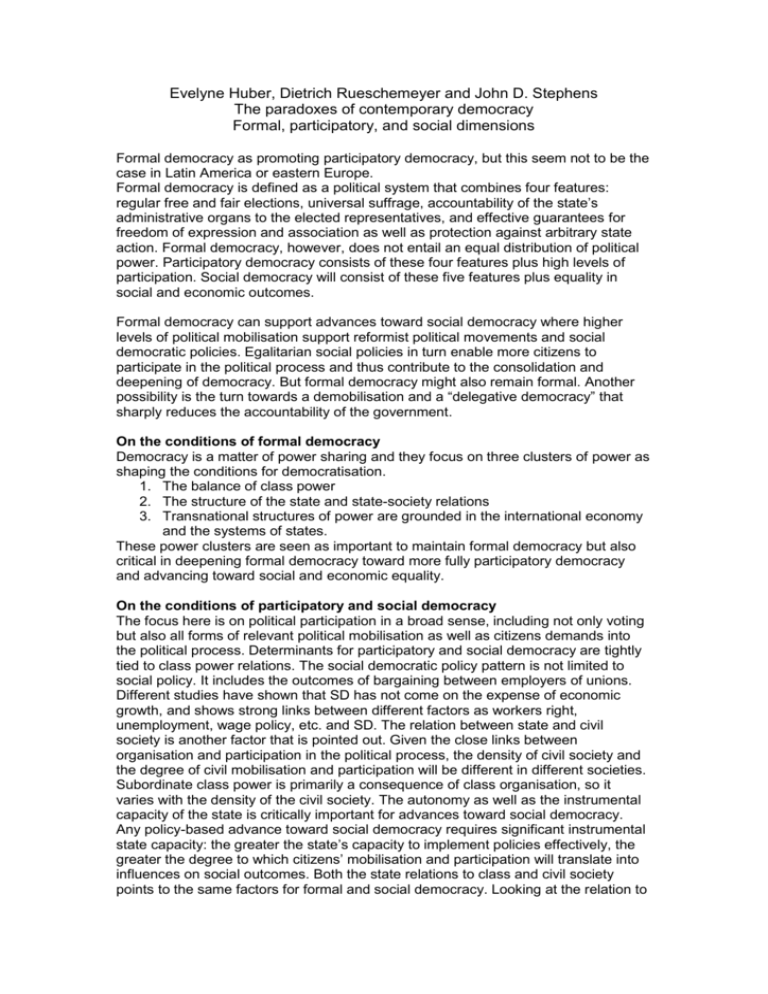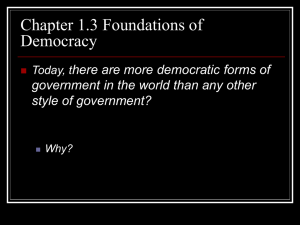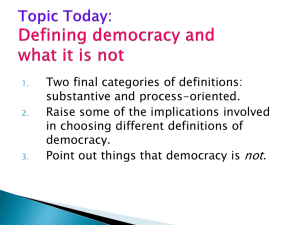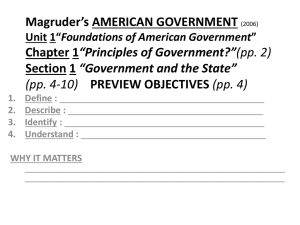TPP W12 Huber
advertisement

Evelyne Huber, Dietrich Rueschemeyer and John D. Stephens The paradoxes of contemporary democracy Formal, participatory, and social dimensions Formal democracy as promoting participatory democracy, but this seem not to be the case in Latin America or eastern Europe. Formal democracy is defined as a political system that combines four features: regular free and fair elections, universal suffrage, accountability of the state’s administrative organs to the elected representatives, and effective guarantees for freedom of expression and association as well as protection against arbitrary state action. Formal democracy, however, does not entail an equal distribution of political power. Participatory democracy consists of these four features plus high levels of participation. Social democracy will consist of these five features plus equality in social and economic outcomes. Formal democracy can support advances toward social democracy where higher levels of political mobilisation support reformist political movements and social democratic policies. Egalitarian social policies in turn enable more citizens to participate in the political process and thus contribute to the consolidation and deepening of democracy. But formal democracy might also remain formal. Another possibility is the turn towards a demobilisation and a “delegative democracy” that sharply reduces the accountability of the government. On the conditions of formal democracy Democracy is a matter of power sharing and they focus on three clusters of power as shaping the conditions for democratisation. 1. The balance of class power 2. The structure of the state and state-society relations 3. Transnational structures of power are grounded in the international economy and the systems of states. These power clusters are seen as important to maintain formal democracy but also critical in deepening formal democracy toward more fully participatory democracy and advancing toward social and economic equality. On the conditions of participatory and social democracy The focus here is on political participation in a broad sense, including not only voting but also all forms of relevant political mobilisation as well as citizens demands into the political process. Determinants for participatory and social democracy are tightly tied to class power relations. The social democratic policy pattern is not limited to social policy. It includes the outcomes of bargaining between employers of unions. Different studies have shown that SD has not come on the expense of economic growth, and shows strong links between different factors as workers right, unemployment, wage policy, etc. and SD. The relation between state and civil society is another factor that is pointed out. Given the close links between organisation and participation in the political process, the density of civil society and the degree of civil mobilisation and participation will be different in different societies. Subordinate class power is primarily a consequence of class organisation, so it varies with the density of the civil society. The autonomy as well as the instrumental capacity of the state is critically important for advances toward social democracy. Any policy-based advance toward social democracy requires significant instrumental state capacity: the greater the state’s capacity to implement policies effectively, the greater the degree to which citizens’ mobilisation and participation will translate into influences on social outcomes. Both the state relations to class and civil society points to the same factors for formal and social democracy. Looking at the relation to transnational structures of power, there are different trajectories. The internationalisation of financial markets has eliminated some of the supply side tools, which were central to social democracy’s economic model. Institutions like the WB, IMF and the US have promoted the neoliberal model to the extend that it has closed off considerations of alternative social democratic policy and, by closing these alternatives, has made popular mobilisation and participation less meaningful. Determinants of formal democracy in contemporary Latin America o Transitional phase vs. consolidation phase Conditions that are favourable for transition may not necessarily be equally favourable for consolidation. The fragmentations of the state apparatus that enabled the transition to formal economies became an obstacle in the consolidation phase. In practice, many new formal democracies has continued to be formal and not achieved the full consolidation in functioning democratic rules and institutions. In addition they tend to lack the accountability, which is part of defining formal democracy. What pushed for initial liberalisation towards democratisation was pressure from a rapidly re-emerging civil society. But these social movements declined after the first democratic elections. The deficiencies of formal democracy can easily be explained by the lack of strong organisations of subordinate classes. Strong organisations of labour and electoral strength of prolabour parties are crucial determinants of the effective implementation of redistributive policies in advanced industrial democracies. The neoliberal adjustment policies implemented to different degrees in virtually all new democracies have moved the balance of class power to capital and aggravated previously high socioeconomic inequality. The combination of financial liberalisation and privatisation of state enterprises has led to a high concentration of economic assets. Economic concentration means the concentration not only of wealth but also of power. The beneficiaries of neoliberal reforms, then, have become very powerful constituencies and obstacles to the pursuit of social democratic policies. In all Latin American formal democracies little has been done to strengthen organised labour and other popular organisations that could function as effective mobilisers of redistributive pressures. State-society relations – Social democratic policies are premised on the fact that the market has inegalitarian consequences that can be corrected only by state intervention. Aside from the political will and power base to undertake redistributive state intervention, a state apparatus must be capable must be capable of executing such policies in a consistent, coherent and effective matter. The lack of such a state is a major problem in the new democracies of LA. Most of these new democracies inherited a state apparatus characterised by fragmentation, overlapping, responsibilities, nonmeritocratic hiring, and often corruption. Transnational structures of power – The international system has had a depressing effect on citizen participation. External pressures to adopt neoliberal policies have reduced the space for policy debates and greatly constrained citizen participation. As policies favouring the unrestrained functioning of the market are imposed on and adopted by increasing numbers of countries, the losers in the new economic order lose not only income, job security, and government supports, but often much of their political voice as well. Consequently, lower class organisation is weakened, further reducing chances for social democratic policies to correct growing socioeconomic inequalities. Financial internationalisation reduces governments capacity to influence interest rates in order to stimulate investment. The dominant mode of integration of the new Latin American democracies into the world economy deprives governments of some of the crucial traditional policy instruments to increase employment, raise real wages, and finance redistributive social policies. The relationship between capitalist development and democracy proves powerful in accounting for current developments in LA. The apparent contradiction between advances in formal democracy and mounting obstacles in deepening democracy towards more participation and dealing with socioeconomic inequality finds a consistent explanation if we look at the impact of the three clusters of power and their interaction.


![“The Progress of invention is really a threat [to monarchy]. Whenever](http://s2.studylib.net/store/data/005328855_1-dcf2226918c1b7efad661cb19485529d-300x300.png)






